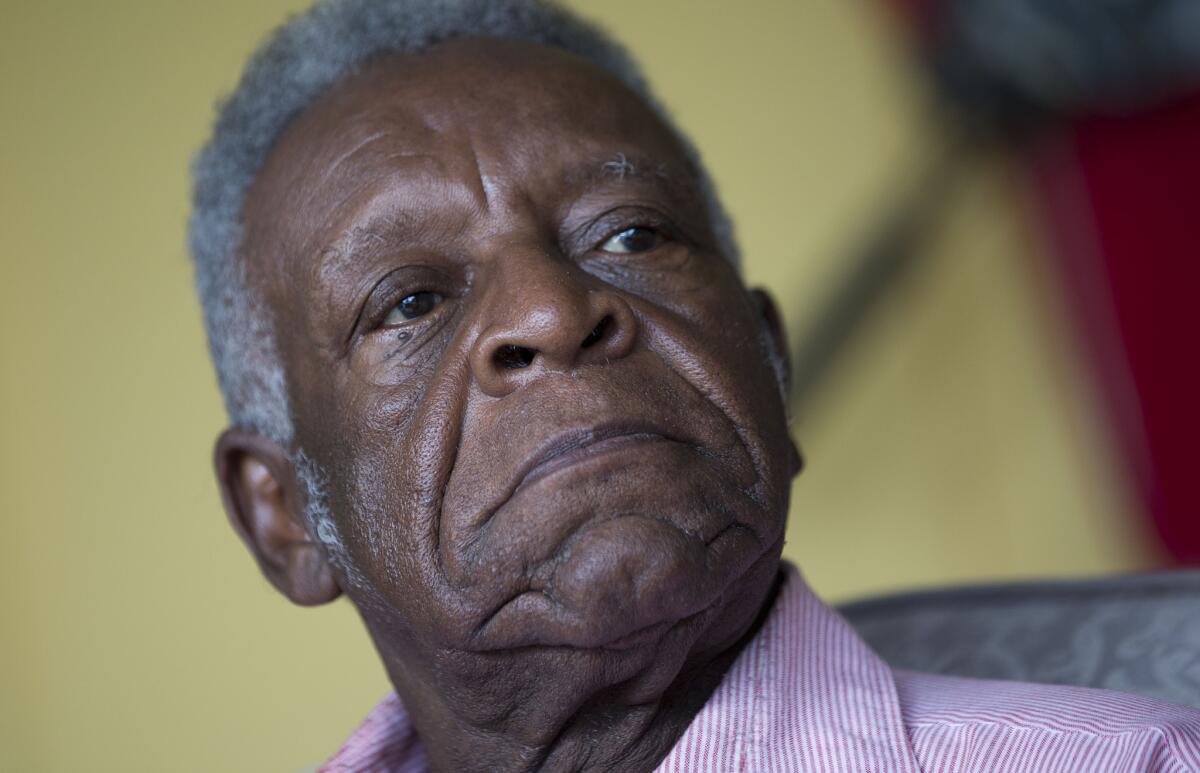Editorial: Will the Supreme Court <em>really</em> end racist jury selection?

The Supreme Court will consider whether prosecutors improperly singled out potential black jurors, including Eddie Hood, above, and excluded them from a death penalty trial in Georgia in 1987 that led to the conviction of a black man.
- Share via
Lawyers for an African American death row inmate asked the Supreme Court on Monday to grant him a new trial because prosecutors used their “peremptory challenges” to keep blacks off the jury that convicted him of murdering an elderly white woman. The court should have no difficulty in agreeing that Timothy Foster’s rights were violated; in their notes, prosecutors wrote “B” next to the names of black prospective jurors and compared one with another in case “it comes down to having to pick one of the black jurors.”
As Justice Elena Kagan observed, that conduct seemed like “the very antithesis” of the court’s ruling in Batson vs. Kentucky, a 1986 case in which it said that prosecutors couldn’t use peremptory challenges — those for which lawyers don’t have to state a reason — as a cover for racial discrimination.
It’s only a matter of time before courts discover other impermissible uses of the peremptory challenge.
But even if the court sides with Foster, the rules it established in that earlier case allow other prosecutors to do the same thing so long as they don’t leave an incriminating paper trail.
Under the Batson ruling, once a defendant has made a prima facie case that a prospective juror was challenged because of his or her race, prosecutors must offer a “neutral,” nonracial explanation for the exclusion. But that’s an extremely low bar; such explanations can cite mere hunches about prospective jurors based on their age, occupation, family connections or even attire. (In Foster’s case, prosecutors in Georgia said they challenged one black juror because he had a teenage son the same age as the defendant, and another because she worked with underprivileged children.)
Citing the ease with which Batson could be circumvented, Justice Stephen G. Breyer in 2005 suggested that the court should reconsider the constitutionality of “the peremptory challenge system as a whole.” Abolishing peremptory challenges would still allow lawyers to challenge prospective jurors, but only “for cause,” based on clear evidence that they couldn’t be impartial.
Breyer’s suggestion would make sense even if judges could somehow root out “nonracial” rationalizations for striking jurors. That’s because, since Batson, the logic of that ruling has been extended to ban peremptory challenges based on gender and, in some jurisdictions, on religion and sexual orientation. It’s only a matter of time before courts discover other impermissible uses of the peremptory challenge, undermining its original purpose of providing a safety valve for lawyers who suspect but can’t prove that a juror might be biased.
Based on Monday’s arguments, it seems unlikely that the court will use this case to embark on the reappraisal Breyer suggested a decade ago. But sooner or later it should confront the possibility that peremptory challenges have outlived their usefulness.
Follow the Opinion section on Twitter @latimesopinion and Facebook
More to Read
A cure for the common opinion
Get thought-provoking perspectives with our weekly newsletter.
You may occasionally receive promotional content from the Los Angeles Times.






